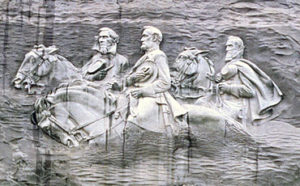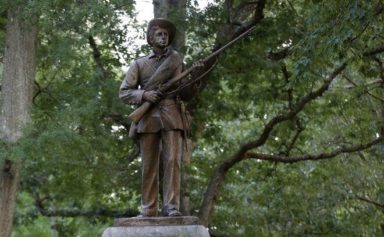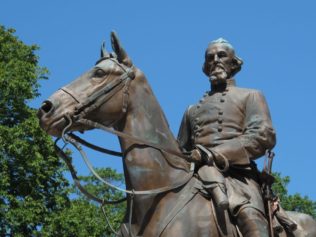In recent days, South Carolina and Alabama removed the “Stars and Bars” from their respective state houses, as the debate continues in Mississippi over whether the Magnolia State should remove the Southern cross from its state flag.
As Southern states take down the Confederate battle flag and remove Confederate emblems, the topic is now shifting to include Confederate monuments. The June 17 Charleston, South Carolina, massacre, in which white supremacist Dylann Roof killed nine Black people at Emanuel AME Church, has brought us to the point where the symbols honoring the Confederacy, including relics, monuments, memorials and statues, are facing greater scrutiny and calls for removal.
But is this movement necessary, or is it a distraction from the real issues?
For example, in North Carolina, attention has been drawn to the monuments honoring the Confederacy. According to WRAL.com, 70 of at least 100 counties in the state have at least one memorial, and 17 counties have more than one. And in Charlotte, Mecklenburg County officials will decide whether to remove a Confederate memorial depicting the battle flag.
Mitch Landrieu, the mayor of New Orleans, has unveiled a plan to remove statues of Confederate president Jefferson Davis, Gen. Robert E. Lee, Gen. P.G.T. Beauregard and other monuments honoring Confederate soldiers. He also wants to rename Jefferson Davis Parkway in honor of Dr. Norman C. Francis, the president of Xavier University, a Black Catholic institution. Landrieu said New Orleans was “a place a where we celebrate life, liberty and the pursuit of happiness, not death, war and slavery,” according to The Guardian, and the statutes were “symbols of supremacy from places of reverence that no longer, if ever, reflect who we are.”
Vocativ found at least 188 public schools nationwide are named after prominent Confederate figures, with over 123,000 students attending those schools. The true number of schools is likely far greater. Some of these are named after members of the Ku Klux Klan, such as Nathan B. Forrest High School in Jacksonville, which was named in 1959 in protest of the Supreme Court’s Brown v. Board of Education decision. The school was only renamed last year. And in San Antonio, Texas, a petition to change the name of Robert E. Lee High School has received over 3,000 signatures on Change.org.
“Purging the U.S. of memorials to slave owners, Klan leaders and Confederates isn’t the same as finding reconciliation for racism,” wrote Mary Sanchez in the Kansas City Star. Sanchez’ article points out that the Civil War is a part of our history that should not be erased, and that problems arise when that history is not properly told. At the same time, history can be remembered through museums, as was the case in South Africa, to educate the public rather than glorify past racist atrocities.
“Symbols that are conflicting to some or perceived to be outright hateful are damaging to the public good,” Susan Glisson, executive director of the Winter Institute of Racial Reconciliation at the University of Mississippi, told The Guardian. Glisson is conducting public forums for Landrieu on the Confederate monument issue. “It can create an environment that doesn’t feel welcoming to everyone. Especially in public spaces where we need to [be] thoughtful to represent who we are as a people.” Meanwhile, Confederate supporters say they have a right to pay respects to their ancestors, and that it is assumed they are insensitive to the plight of slaves and their descendants. Ben Jones, a spokesman for the Sons of Confederate Veterans and former star of the television show The Dukes of Hazzard, said Landrieu’s proposal was “a massive insult” and a “phony Band-Aid” that does nothing about racism.
From the standpoint of Black people and others, there should be no interest in retaining those memorials that promote the Confederate cause, one which was expressly waged to uphold white supremacy and the subjugation of Black people. No one would tolerate a memorial in Europe that promotes Adolf Hitler or the Nazi cause in World War II.
Nevertheless, we risk becoming sidetracked if we focus solely on the symbols of oppression without addressing and eradicating the policies of oppression. The legacy of the Dixiecrats and Southern segregationists of the Jim Crow era continues to the present, with conservative Tea Party Republicans promoting racial gerrymandering, voter ID and other voter suppression efforts to dilute and erase Black, Latino and other voters. These policies are as hateful and as supportive of white supremacy as that Confederate flag and arguably more harmful to Black people.
On NBC’s Meet the Press, South Carolina Gov. Nikki Haley — who called for the removal of the Confederate flag in her state — said voter ID is not a racial issue. Host Chuck Todd asked Haley, “You know, one of the issues of Clementa Pinckney was the voting rights laws. That’s been a big controversy with a lot of African-Americans, particularly, and with a lot of Republican governors. Do you see the issue differently now? Do you understand why some African-Americans believe these voter ID laws end up being a way to single them out or disenfranchise them?”
“You know, the flag coming down was a moment that I felt like needed to happen. That doesn’t mean that I philosophically changed the way I think about other things. I’ve never seen the voter ID as a racial issue, for whites, for blacks, for Asians, for anyone,” Haley responded. “And I think that’s something very important for our democracy. It’s important to America. And I think that, having to show a picture ID when you get on a plane, and having to show a picture ID when you buy Sudafed, you absolutely should have to show a picture ID to vote.”
So, while there is a movement to remove the Confederate flag and monuments that promote the enslavement of Black people and wrong side of history, there is also a movement to fight against voter suppression — as is the case with the NAACP in North Carolina and the Moral Mondays movement. Further, there is a #BlackLivesMatter movement to address the killing of Black bodies through police and vigilante violence. If these efforts fail to join forces to eradicate oppressive policies and replace them with just laws for our uplift, then dismantling every last rebel monument in America will take us nowhere.



